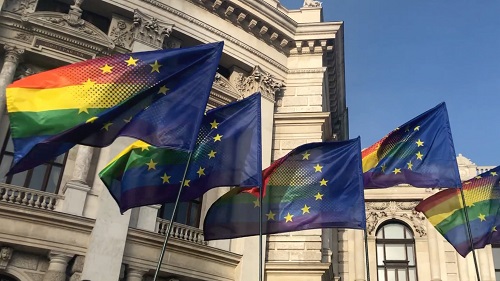
EU confident Ghana will not assent anti-LGBTQI Bill
In a recent speech delivered at the European Parliament on April 24, 2024, Virginijus Sinkevičius, the European Union Commissioner for Environment, Oceans and Fisheries, representing High Representative/Vice-President Josep Borrell, addressed the concerns surrounding Ghana's Human Sexual Rights and Family Values Act, commonly known as the anti-LGBTIQ Bill.
Highlighting Ghana's status as a solid democracy and a stabilizing force in the region, Mr. Sinkevičius acknowledged the country's positive steps in human rights protection, including recent efforts towards abolishing the death penalty.
However, he also noted existing challenges, particularly in safeguarding the rights of sexual minorities.
The passing of the anti-LGBTIQ Bill in Ghana's Parliament has raised concerns both domestically and internationally. The Bill is currently under scrutiny by the Supreme Court regarding its constitutionality. Moreover, it awaits presidential assent to become law.
He said the European Union, alongside its Member States, has closely monitored the developments surrounding the Bill since its introduction in 2021.
Despite the passage of the bill by Ghana's Parliament, Mr. Sinkevičius expressed confidence in Ghana's commitment to human rights, citing public statements from the President and senior government officials highlighting concerns about potential setbacks in human rights and financial implications.
Ghana's role in ensuring regional stability and its evolving partnership with the EU were also emphasized. He said the EU values Ghana's commitment to shared interests, including support for a rules-based multilateral order and the abolition of the death penalty.
The speech concluded with a reaffirmation of the EU's partnership with Ghana, highlighting mutual respect for human rights and a commitment to follow Ghana's promising path in upholding universal values.
Read the entire speech below;
Ghana: Speech by High Representative/Vice-President Josep Borrell in the EP plenary on the LGBTIQ bill passed by the Ghanaian parliament
Speech delivered by Commissioner for Environment, Oceans and Fisheries, Virginijus Sinkevičius, on behalf of High Representative/Vice-President Josep Borrell
Check against delivery!
President, Honourable Members,
Ghana, a solid democracy and anchor of regional stability, has a strong record in terms of protecting human rights through its laws and through its practice. Significant steps have been taken in this area. See, for example, Ghana’s decision of last year to take steps towards abolishing death penalty.
However, challenges remain notably in the area of the protection of sexual minorities. The recent passing in Parliament of the Human Sexual Rights and Family Values Act, more commonly referred to as the anti-LGBTIQ Bill, is an issue of concern in Ghana as it is the case in any other country on the continent and in the world. In its current form, the Bill requires close review in light of Ghana’s international and constitutional human rights commitments.
The constitutionality of the Bill has been challenged and it is currently scrutinised by the Supreme Court.
It is also to be noted that the Bill also still requires presidential assent to enter into force. The President has publicly reiterated his commitment to the respect of Human Rights and has expressed his concern to seeing a “backsliding” on human rights in the event of adoption of the Bill. Senior members of the Ghanaian Government have also highlighted the Bill’s potential financial consequences and losses for the 2024 budget.
We are therefore confident that Ghana will stand firm in the commitments it has made on national and international Human Rights.
The European Union, together with its Member States, have followed the matter closely since its introduction in 2021. Our position and concerns on the matter are well-known and regularly communicated. Ghana has a pivotal role in ensuring regional stability in an increasingly volatile region, marked by spill over of insecurity from the Sahel to the Gulf of Guinea countries.
The European Union has succeeded in further deepening its partnership with Ghana, as it evolved from a strictly developmental partnership to a more political one that is fit to face regional political and security challenges.
It is therefore of utmost importance that we remain close and build upon Ghana’s and EU’s already strong partnership to defend our common values.
Link to the video: https://audiovisual.ec.europa.eu/en/video/I-256408
Closing remarks
President, Honourable Members,
The debate today illustrates European Union’s commitment to defend Human Rights as universal values.
Ghana has shown strong commitment to shared interests in a rules-based multilateral order, notably in the context of the Russian aggression in Ukraine, and on values dear to the European Union, such as the abolition of the death penalty, an important milestone in Ghana’s support for Human Rights.
Therefore, we cannot but partner in Ghana’s commitment and regional leadership and in his respect of Human Rights and continue to follow the country in this promising path.
Thank you.
